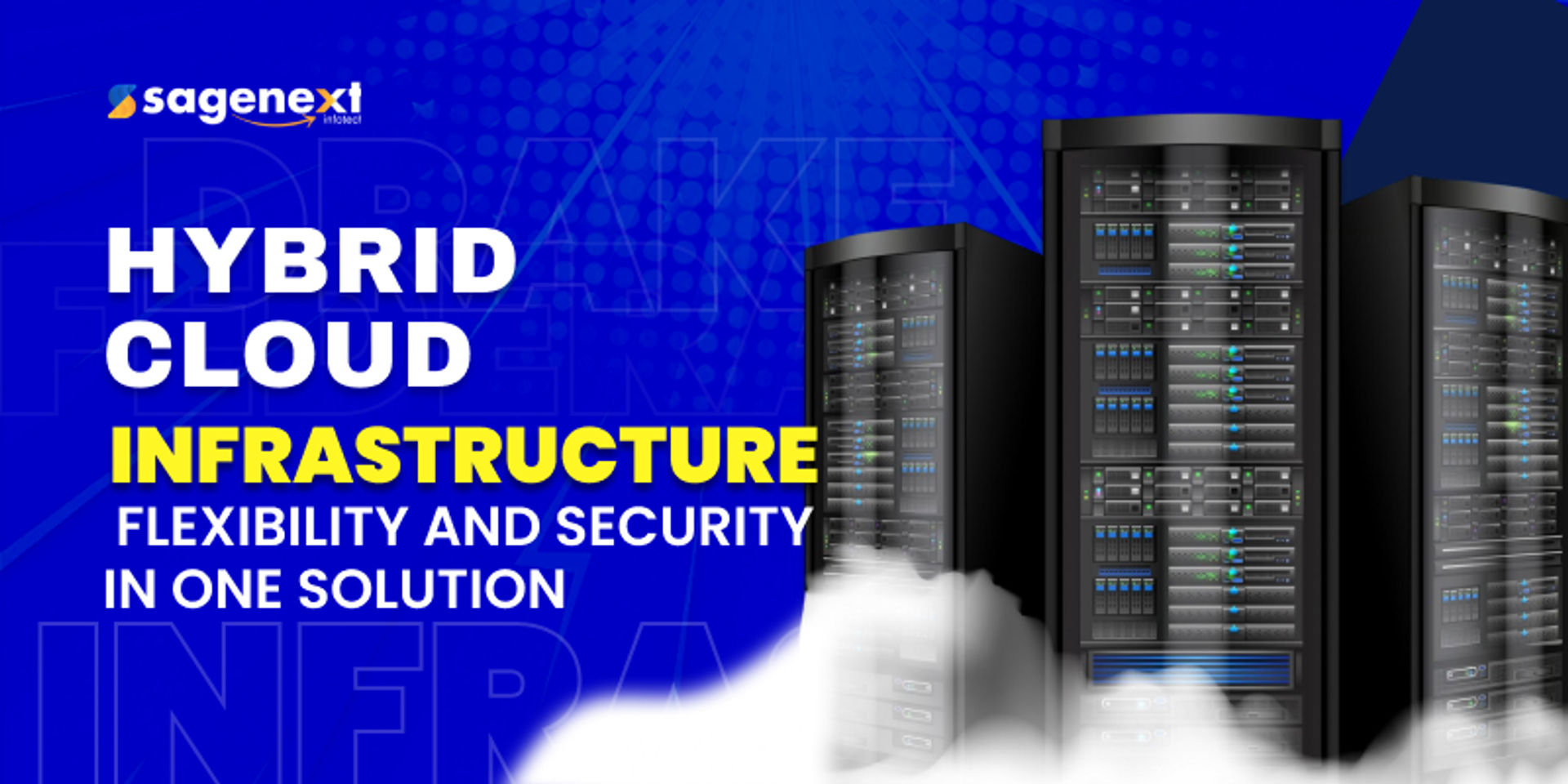The increasing growth in digital technologies has enabled organizations to adapt systems, such as hybrid cloud infrastructure, quickly. Businesses are making their operational workflows seamless by efficiently using both public cloud and private cloud infrastructure. Although the term hybrid cloud can have different meanings, it typically refers to the use of both public and private clouds, or a combination of public cloud and private on-premise (in-house) cloud systems.
Astonishingly, according to reports, the hybrid cloud market is expected to reach a whopping $430 billion by 2030, expecting to grow at a CAGR of about 22%. Moreover, 90% of the organizations across the globe will adopt a hybrid cloud infrastructure by 2027. A Hybrid Cloud Infrastructure is a computing model. As an IT architecture, it offers both automation and elasticity. Hybrid cloud infrastructure is known to have an upper hand in providing cost-effective solutions.
But, what exactly is a Hybrid Cloud Infrastructure? How would it benefit your business? What are its types and challenges? This article will cover every aspect of hybrid cloud Infrastructure.

Hybrid Cloud Market. Source: Mordor Intelligence
What is Hybrid Cloud?
There is not much of a difference between a hybrid cloud and a hybrid cloud infrastructure. Both terms generally mean the same. However, A hybrid cloud is a mixed computing environment where applications run using a combination of computing, storage, and networking services in different environments. On the other hand, a hybrid cloud infrastructure allows you to store and run applications smoothly and securely, utilizing both public cloud and private cloud computing systems. Hybrid cloud infrastructure services are ideal for businesses, as they effectively manage and run computer resources.
What is Hybrid Cloud Infrastructure?
As the name suggests, a hybrid cloud Infrastructure is a platform that integrates more than one cloud service, such as a public or private cloud, in a single environment, enabled by some form of orchestration between both services. The hybrid cloud infrastructure has software components and the architecture of the cloud model.
To understand it better, let us get deeper into the term hybrid cloud infrastructure.
Public Cloud
- Public Cloud is an IT model where a third-party provider manages computing services.
- The services a Public Cloud provides are shared with multiple businesses using the public internet.
- Public Cloud gives everyone access irrespective of their identity and is comparatively cheap.
- An example of a Public Cloud is Microsoft Azure.
Private Cloud
- A private cloud is a computing model in which the infrastructure is committed to a single user organization.
- It is far more expensive than a Public Cloud Service.
- Not everyone has access to the Private Cloud because it acts as a reserved table at a restaurant.
- An example of a Private Cloud is Oracle.

A glimpse of a hybrid cloud network structure.
In simpler terms, a Hybrid Cloud is an IT design segment that consists of Private and Public Clouds and, at times, on-premises infrastructure. As a computing model, the hybrid cloud infrastructure provides application maneuverability among public and private clouds. When data is moved to a Hybrid Cloud Infrastructure, the business's flexibility grows widely. Most organizations find it a notable shift to a Hybrid Cloud as it proves to be a cost-optimal cloud service.
The Hybrid Cloud Infrastructure migrates workloads across environments per your business demands. Businesses adopting a Hybrid Cloud Infrastructure can comfortably store sensitive data on a private cloud while enjoying the benefits of a public cloud. The effectiveness of a Hybrid Cloud is at its best when the service is well-architected.
Here are a few factors to consider:
- A Hybrid Cloud Infrastructure should be able to connect various devices, such as computers and laptops, through a network.
- It should unite all the IT resources, whether software- or hardware-based.
- Be freely able to move day-to-day tasks among all the environments.
- The hybrid Cloud should incorporate a single management tool.
- The automation feature provided by the Hybrid Cloud Infrastructure should be able to initiate processes well.
What is Hybrid Cloud Infrastructure? How Does it Work?
Hybrid Cloud Architecture is just a blend of public and private cloud services. This fusion unlocks modern tools that enable orchestration among applications. The functioning strategy of Hybrid Cloud Infrastructure seems possible because of:
- Data Virtualization
- Connective Tools & Protocols: Local Area Network (LAN), Wide Area Network (WAN), Virtual Private Network (VPN), and Application Programming Interfaces (APIs)
- Connectivity to several Cloud Providers
The interconnectivity among the services should serve the following purposes to achieve great workability:
- Smooth migration of workloads among services
- The management should be unified
- The processes should be orchestrated
The above implementations help achieve a successful Hybrid Cloud Infrastructure. Organizations can migrate workloads across all services, and so business owners tend to incline towards a Hybrid Cloud Infrastructure, which has two variations.

The image showcases a hybrid cloud architecture.
Types of Hybrid Cloud Infrastructure

Traditional Hybrid Cloud Infrastructure
Traditional hybrid cloud infrastructure uses both private and public clouds. LAN, WAN, or VPN links these cloud services. Enterprises adopting traditional hybrid cloud can create their own private cloud or use a pre-packaged one.
Modern Hybrid Cloud Infrastructure
Modern Hybrid Clouds can function without networks, as they use a common operating system for the deployment of all applications. They also use software-defined networking technology with network virtualization.
Different Types of Hybrid Cloud Platforms

Organizations can come across high demands at any point in their business. They can scale and pay for the same, however, the suitability of the hybrid cloud platform may face issues. Hybrid cloud computing platforms focus on specific management tools that ensure synchronized operation. Businesses choose a suitable cloud platform based on their IT requirements.
 Partner Managed Cloud
Partner Managed Cloud
Many cloud service providers offer Hybrid Cloud Infrastructure as a solution. Known for providing a consistent infrastructure, the Partner Managed Cloud Solution also smoothens business operations. These are compatible with on-premise cloud-based solutions.
 Customer Managed Cloud
Customer Managed Cloud
Customer Managed Cloud acts as a Private Cloud, which can be utilized in an on-premises infrastructure. It can even be deployed in a hyper-converged infrastructure. Portions of this Cloud Service are even offered as Software-as-a-Service (SaaS) solutions. They are deployed both on-premise and in edge environments using hyperconverged infrastructure modules.
 Vendor Managed Cloud
Vendor Managed Cloud
Hybrid Solutions become highly manageable as a Vendor Managed Cloud Platform. It is a fully hosted software as well as a hardware-based cloud solution. Customers can outsource their hybrid cloud operations.
 Cloud Provider Managed
Cloud Provider Managed
Large-scale cloud providers offer high-quality cloud services. The solutions provided are based on the foundational infrastructure. The business operations become highly compatible with the Private Cloud. The installation of a hybrid cloud computing Infrastructure requires significant investment and care. However, the efforts are all worth it. The cloud service offers several key benefits to enhance business performance.
What Are The Benefits of Hybrid Cloud Infrastructure?

Over the past decade, businesses have increasingly been dependent on hybrid cloud infrastructure solutions. There are many reasons why organizations choose to stick to a Hybrid Cloud among so many options, because the hybrid cloud offers many benefits as compared to other solutions.
Here are the unmatched benefits:
1. Economical Solution
Business owners should always be prudent about the costs they spend or the investments they make. Organizations shifting from their previous cloud to a hybrid cloud must consider the price, as it becomes the primary factor in their decision. Adopting a Hybrid Cloud Infrastructure is the most cost-effective way as it provides companies with better security at a very reasonable price.
Organizations using Hybrid Cloud do not need to incur substantial capital expenditures whenever the demand spikes. They are supposed to pay only for the Cloud Services they are using. A hybrid infrastructure allows you the flexibility to go cloud-based as well as on-premises according to your business requirements.
2. Robust Security
Businesses using the Hybrid Cloud model benefit from managing it according to their specific IT needs. The Private Cloud, on one hand, can be used for safeguarding data, while the Public Cloud, on the other hand, offers powerful options. The hybrid Cloud makes it way easier for companies to store, transfer, and protect data. It reduces data exposure, which in turn helps companies maintain enhanced control over their data. The data is generally end-to-end encrypted during transmission and adheres to SOC-1 & SOC-2 reports for data center safety.
3. Better Control & Scalability
Business is constantly evolving. The IT services you are using today might fluctuate tomorrow, or worse, be discontinued at any point in time. With a Hybrid Cloud Infrastructure, organizations can easily scale their tasks according to the changes. With enhanced scalability, Hybrid Cloud offers better control over company data. It is not only known for providing enhanced scalability but also for better automation, making it easier for companies to adjust their cloud settings and achieve maximized business performance.
4. Business Consistency
With Hybrid Cloud Infrastructure, business consistency is stabilized, ensuring no technical interruptions. When services go down due to a server issue, companies have to spend a significant amount of money recovering them. The hybrid Cloud Model in this sense is an innovative solution. This continuity helps prevent the servers from becoming overburdened, which is a significant cause of server downtime. Cloud-based solutions generally offer 99.9% server uptime with minimal downtime.
5. Better Cross-Functionality
A hybrid Cloud involves more than a single cloud platform. This feature simplifies the interoperability among workloads as components of one platform can be seamlessly transferred to another. Effortless business functionality is promised with the Hybrid Cloud as a solution. Hybrid Cloud Infrastructure, being a new trend in the world of IT, has proven to be a boon for most organizations. However, the implementation of a Hybrid Cloud faces some common and uncommon challenges that may act as stumbling blocks when put to use.
6. Better Maneuverability
We know how quickly markets adopt new products and trends. When companies fail to keep pace with the rapid market trends, it significantly disrupts their business growth prospects. The hybrid cloud model provides companies with the necessary maneuverability, enabling them to meet all their business demands. The process of data transfer becomes simplified with the hybrid cloud, allowing the use of edge computing and making the IT framework as fast as possible.
7. Improved Performance & Flexibility
By deploying public cloud and private cloud, businesses can seamlessly reduce latencies and improve the software application productivity. Moreover, a hybrid cloud computing infrastructure provides enhanced flexibility, allowing businesses to scale up when needed and scale down when not required.
What Are The Challenges of Hybrid Cloud Infrastructure?

While the Hybrid cloud offers many benefits, it also presents a few challenges that can be overcome. Here are those challenges:
1. Governance Issues
Governance plays a vital role in IT setups. Traditionally, it was used to provide insights, but presently, there are some set goals of governance, which are to:
- Promote Evenness
- Provide correct direction and insights
- Betterment of the IT setup
- Accelerate the process Organizations should also approach the service provider with three motives:
- To implement automation,
- self-management, and
- Software-expounded unified management infrastructure.
They can even adopt the Cloud Management Platform (CMP), which is known to simplify the working strategy of Private and Public Cloud as a unified platform. Hybrid cloud benefits are enormous, but addressing those challenges makes it a more powerful solution.
2. Difficulty in Workload Relocation
Migrating your workload from one Cloud Service to another can be a damning event. Not only does it take time, but it is also resource-intensive. Moving data to a hybrid cloud requires integrating multiple elements, including sole cloud providers and Endemic Characteristics. Most organizations lack the necessary IT skills required to deploy work from the previous Cloud to the Hybrid Cloud.
Before migrating, several tasks should be performed by the team:- Scrutinizing workload characteristics such as Operational and Performance
- There should be a capacity plan that will help eliminate underutilized services
- The planning for data security, network, and storage should be done beforehand
- The present applications should be made serviceable across an on-premises infrastructure.
3. Compliance Concerns
Primarily, organizations in large sectors target the Hybrid Cloud Infrastructure. There are specific regulations governing customer data. This data is very delicate and so falls prey to threats at times. Security in that sense should be at its best, as the storage of the customer data remains a concern. Migrating the workload to a Hybrid Cloud is a beneficial choice business owners make. However, it makes maintaining compliance in the business difficult.
To ensure compliance in your business, make a note of the following things:- If your organization follows a concrete regulation, you should include it in the initial workload planning.
- When working on a Hybrid Cloud, ensure that you inspect each division individually. The inspection should be done both as a single service and as a unified service.
- Every organization has its own set of rules and regulations. The Hybrid Cloud Infrastructure should be compliant with all of them.
4. Data Security Concerns
The adoption of a complex Hybrid Cloud can compromise data, whether it is at rest or in use. However, the types of threats to data differ depending on whether the data is active or in transit. Various interludes and alterations can pose a threat to the data.
There are some ways through which organizations can achieve data protection, such as:- Adopting Full-Disk Encryption can be a primary source of data protection, a process that encodes data using an encrypted key.
- The Trusted Platform Module (TPM) should be a part of Network Bound Disk Encryption (NBDE). This helps add extra security layers.
- Users must not manually enter their passwords into encrypted drives, as this poses a security threat.
- Moving to Hardware Encryption can also protect the data at a high level because the encryptions take place within the drive.
5. Unclear Supervision
The adoption of a Hybrid Cloud requires a broader and clearer range of visibility and control over business operations. However, organizations often struggle with this. A characteristically superior cloud model, Hybrid Cloud is usually confused with a term almost synonymous with it, namely, the Multi-Cloud model. Among the terminological similarities, there is, in fact, a difference between the two terms.
This ambiguity leads to the following consequences:- Organizations may face challenges in responding to sudden developments.
- The lack of clarity in the vision leads to a lack of collaboration.
- The implementation of self-service systems can become difficult, potentially creating long-term problems.
- The configuration settings may become unclear to the lowest.
6. Outlay Concerns
Migrating your workload from the previous Cloud to the Hybrid Cloud surely helps in reducing the overall cost. However, the price can exceed your budget if not planned strategically. However, the adoption of a Hybrid Cloud Infrastructure can also help identify the inconsistencies in both services. This detection helps prevent all sorts of service shortages, thereby avoiding massive expenses.
Understanding Hybrid Cloud vs Multi-Cloud Model
The fact that these terms, Hybrid Cloud and Multi-Cloud, are often used interchangeably has increased the misconception that they are homogeneous. However, the infrastructure is the key difference between them.
| Hybrid Cloud Model | Multi-Cloud Model |
|---|---|
| A Hybrid Cloud Infrastructure is a combination of both Private and Public clouds with some form of orchestration among them. It provides companies with great flexibility by making workload migration easy. Conventionally, the private clouds were inbuilt, known as on-premises. However, they are currently built off-premises. | A Multi-Cloud Model, on the other hand, contains only Public Cloud Infrastructure, such as infrastructure as a service (IaaS) and platform as a service (PaaS), among others. Whenever businesses outsource application hosting to a third-party such as Google, Amazon, or Microsoft, it is considered a Public Cloud. |

The image shows the difference between the infrastructure of the hybrid cloud and the multi-cloud model.
Is Hybrid Cloud Infrastructure Secure?
No doubt, the Hybrid Cloud is a highly secure platform for protecting an organization’s data. All organizations are deeply concerned about their sensitive data, which is a valuable asset in a business. While migrating your workload to a Hybrid Cloud, it is common for you to question the authenticity of the platform. However, Hybrid Cloud serves as a secure foundation for all types of businesses, thereby eliminating any doubts about its vulnerability.
A Hybrid Model should be properly set up and integrated with itself. This way, Hybrid Cloud can achieve the same level of security as that of conventional on-premises infrastructures. This model, in terms of security, is the best out of all as it represents an integrated platform.
How to Choose the Best Hybrid Cloud Infrastructure Model

Before adopting this enchanting contract between different cloud services, an organization should consider several key factors. Organizations are shifting to a hybrid model to simplify their business operations.
1. Homogeneous Infrastructure
Most organizations use an on-premises infrastructure to ensure smooth business operations. Adopting a Hybrid Cloud that integrates all the options of your previous infrastructure is required. If your private and public clouds align properly, it helps simplify the migration of your workload. A hybrid offers a seamless and smooth cloud solution for your business to grow and scale.
2. Know Workload & Operations
Understanding and analyzing your company’s workload is a crucial aspect that helps determine a suitable Hybrid Cloud Model. Business demands are situational, and they expand as you grow your business. Organizations should focus on a hybrid model that can adapt well to the changing business needs. With workloads, you need to decide on where to locate the model. Understanding your workload helps you choose a model that integrates well with various platforms and devices.
3. Know The Safety Concerns (If Any)
Security plays a crucial role in every business, as the company data can easily fall prey to data breaches and hackers. A Hybrid Cloud should be able to protect data from both internal and external threats. Hybrid Cloud Infrastructure is known to offer several security measures that act as a shield against threats. Your Hybrid Model should be able to implement various security measures with complete details about compliance and the risk management process.
4. Complex Onboarding Process
Migrating your workload from one infrastructure to another can be a daunting task. It is time-consuming and can be troublesome with large-scale data. You should always opt for a model that has an easy onboarding process, so that workload migration does not seem like a daunting task. You should be clear of the processes involved and the criteria to fulfill them.
5. Cost Factors
Being mindful of a business budget is the wisest approach, regardless of the category in which a business operates. Starting and ending a contract with a service provider is not free of cost. Business owners should opt for a model that offers reasonable pricing, inclusive of all the necessary features.
Migrating your workload is not an easy task, so business owners are advised to choose the Hybrid Model wisely after considering the essential factors. This care will not only help you achieve the best Hybrid Solution but also significantly enhance your business.
6. Availability Factors
Service availability is an imperative factor when it comes to a Hybrid Model. Organizations should always confirm the availability guaranteed by their service providers. A good Cloud Hybrid Infrastructure provider will not only provide these security measures, such as tokens, but will also offer compensation if the Cloud Service fails to meet the needs. The provider’s approach to security and other measures should be straightforward, which makes them a trustworthy source.
Top 5 Hybrid Cloud Infrastructure Solutions in 2025
As businesses shift to a hybrid cloud solution, how do you decide which solution is worth adopting or migrating to? Here is a list of the top 5 Hybrid Cloud Solutions in 2025.
1. Microsoft Azure Cloud Solutions
Microsoft Azure Cloud Solutions are an excellent fit for the upcoming fresh cloud technologies. The specialty of Azure Cloud is that it can be used anywhere, whether on-premises or in the cloud. Azure Cloud offers a range of solutions, including Azure Stack Hub, Azure Databricks, Azure Synapse, Azure AI and Machine Learning, Azure SQL, Azure Security, and Azure Cognitive Services.
It not only enhances the smooth functioning but also implements disaster recovery. Azure, as a cloud service provider, is recognized as the leading market leader in both private and public clouds. Utilizing Azure Cloud Services offers numerous benefits, including the modernization of applications. Today, it is one of the best cloud solutions for your businesses.

2. AWS Cloud Solutions
AWS Hybrid Cloud Solution guarantees to provide you with a consistent AWS experience, be it on-premises or in the cloud. Being a giant Hybrid Model, it overlaps every service provider as it owns 33% of the entire cloud business. The cloud services of AWS are known for eliminating the complexity of all APIs. Businesses no longer need to rely on third-party services, and adopting AWS frees them from the worries of sudden updates and upgrades.
AWS Hybrid Cloud provides hybrid cloud services, including AWS Outpost, AWS Wavelength, AWS Local Zones, and AWS Snow. With Amazon cloud services, you gain benefits such as accelerating digital transformation, enhancing IT and developer productivity, and delivering differentiated services and experiences.

3. IBM Cloud Solutions
If business owners want to shift their workload to a hybrid model, it is strongly advised to consider IBM Hybrid Cloud Infrastructure Solutions. Currently, IBM owns only 5% of the entire cloud market, but it remains one of the most well-known cloud service providers. IBM offers various cloud solutions, including IBM Cloud Pak and IBM Watson, among others.
The most famous service, IBM Cloud Pak, is composed of the IBM Red Hat Platform, which enables the Pak to run on any Hybrid Cloud. IBM Cloud solutions support the simplified use of packed environments, as IBM is the first cloud platform to integrate with OpenShift 4, an open-source platform that delivers full-stack automation.

4. Salesforce Cloud Solutions
Salesforce is one of the top-performing and leading SaaS providers globally. Salesforce provides an advanced hybrid cloud infrastructure tailored to your business needs. Their cloud services include cloud-based software, applications, CRM, e-commerce modules, and other services.

5. Google Cloud Solutions
Google is already well-known to everyone. And yes, Google Cloud Platform offers services similar to those of AWS Cloud and Azure. Google Cloud has been expanding rapidly with its innovations in AI, machine learning (ML), and Kubernetes. Google Cloud also offers Google Workspace, Google Drive, Google Cloud Console, and YouTube platforms. Google is taking businesses by surprise with its innovative hybrid cloud infrastructure platforms.

When to Introduce Hybrid Cloud Infrastructure to Your Business?
Today, almost every organization is working on some cloud platform or another. At times, the organizations do not perform well in their business, but it is not because they are incompetent. The sole reason can be an exhaustive cloud service. Knowing when to shift to a Hybrid Cloud is essential. Here are a few factors to consider:
1. If Your Businesses Face High Server Latency
Organizations face latency because their cloud does not support agility. Due to service unavailability, wide-scale disruptions occur, rendering businesses less operational. Businesses operating on a distributed geographical level may frequently encounter latency issues. Achieving substantial agility is crucial for every business, regardless of whether it is a large enterprise or a startup.
Introducing your business with a Hybrid Cloud Infrastructure eliminates the possibility of latency or service shortages as it provides two different types of services. If your business is relying on outdated services, we suggest migrating your workload to a Hybrid Platform.
2. If Your Businesses Face a Lot of Threat
Data security is the top priority of every business owner. A company’s data is more like its asset, which can’t be put at risk by trusting a random cloud service. Cybercrimes often occur without warning, and you should never give them a way in the first place.
Adopting a Hybrid cloud infrastructure model helps reduce the risk of cyberattacks by safeguarding the company’s data with all necessary security measures. Cyber threats are a little hard to detect; your company might be under threat all the time, and you may not even realize it. So, it is always better to stay cautious.
3. If Your Business Expenses Are Too High
Cost is the foundation of both new and existing projects in any business. If the cost does not align with the organization's needs, the project will be in vain. From an efficiency point of view, spending a lot on getting the data settled is not a very smart decision.
If your costs are coming out to be extraordinarily high, then this might be an indication for you to consider shifting to Hybrid Cloud Infrastructures. A hybrid Cloud is a blend of public and private clouds that enables organizations to pay only for the service they are using, instead of making massive expenditures.
4. If Your Business Starts Losing Skills
When you have a forte in something, you never want to lose it because of technological issues. Losing your key skills significantly affects the business, as you hold a monopoly. Indeed, a business cannot always remain as productive as it is on certain lucky days, but that should never cause your organization to lose hold of its key skills.
As a business owner, if you believe your business is losing its key skills due to working on an exhaustive and partly supportive cloud platform, we recommend migrating your work to a Hybrid Cloud Infrastructure Model. The hybrid Model will ensure ease of functioning by introducing features such as active cloud architecture, performance reporting, and efficient workload management.
Concluding Lines
Hybrid Cloud Infrastructure offers cloud services catered to business demands and provides the best cloud solution. Doing so becomes easy as the Hybrid cloud computing model integrates both public and private cloud platforms simultaneously. This simplifies the processes and provides the organizations with the benefits of both private and public clouds.
Hybrid Cloud Infrastructure proves to be a reliable source, enabling organizations to rely on it with confidence. Organizations often dream of expanding their businesses significantly, and with this, they strive to ensure their complete functionality, even in the long term. Adopting a Hybrid Cloud will help achieve this goal by providing a simplified working environment and ensuring a budget-friendly business operation. Hybrid infrastructure is beneficial, but it also poses some significant challenges that businesses can overcome. You can host your next hybrid cloud infrastructure with us.
FAQs (Frequently Asked Questions)
What are the three types of cloud infrastructure?
Mainly, there are three types of cloud infrastructures. Those are Infrastructure as a Service (IaaS), Platform as a Service (PaaS), and Software as a Service (SaaS).
Is AWS a hybrid cloud?
Yes, Amazon Web Services (AWS) is a hybrid cloud solution that provides on-premise infrastructure cloud services. It offers tools and applications to manage, store, and network for hybrid cloud options.
What is the difference between cloud and hybrid cloud?
A hybrid cloud Infrastructure combines both on-premise and cloud-based services. On the other hand, cloud computing provides cloud storage, networking, software, and services.
What is a hybrid cloud for dummies?
A hybrid cloud infrastructure combines both on-premises and cloud servers, allowing you to utilize extra storage when needed and maintain sensitive data and software applications on your own servers. This dual setup acts as a dummy for one another.
Is Microsoft Azure a hybrid cloud?
Yes, Microsoft Azure is a hybrid cloud solution provider. It is one of the leading cloud providers in the global market. It offers products such as Azure Stack and Azure Arc.
Trusted Partners Play a Vital Role in Ensuring a Seamless Hosting Experience.
These carefully selected partners contribute their expertise in technology, infrastructure and support solutions, enhancing reliability and performance. Through this collaboration, Sagenext delivers a dependable and efficient hosting environment, allowing users to work without disruptions and enjoy optimal stability and security.
























Sagenext has consistently garnered distinguished recognition for its exceptional hosting services, characterized by a resolute dedication to innovation and customer delight. This unwavering commitment to excellence has been demonstrably acknowledged through the receipt of numerous prestigious awards and accolades, solidifying Sagenext's position as an industry leader.
 Great Uptime by HostAdvice
Great Uptime by HostAdvice Great User Experience by Finances Online
Great User Experience by Finances Online Rising Star Award by Compare Camp
Rising Star Award by Compare Camp Top 10 Cloud Hosting Host Advice
Top 10 Cloud Hosting Host Advice

